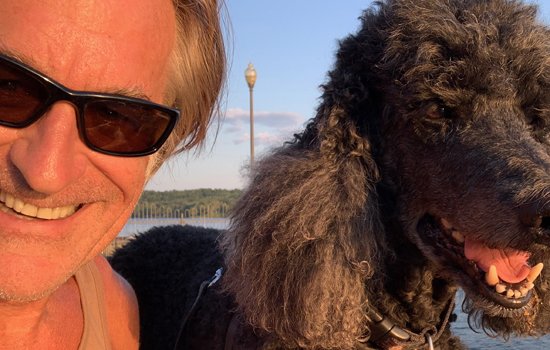Reading time: About 2 minutes
Andrew Binks says that having the chance to ruminate, without being connected to any device, helps to make him a better writer….
Andrew Binks is the author of two novels, Strip (Nightwood Editions, long listed for the Lambda awards) and The Summer Betweeen (Nightwood Editions). He holds an MFA in Creative Writing from the University of British Columbia and a BA in Drama from Queen’s University (Kingston, Ontario, Canada). His next novel, The Agreement, will be published with Cormorant Books in 2026.
Writing credits include being a finalist in The Writers’ Union Short Prose contest and This Magazine’s Great Canadian Literary Hunt, and placing Second in Prairie Fire’s Non-fiction contest. His fiction, non-fiction and poetry has been published and anthologized in Canada (Globe & Mail, Prism, joylandmagazine.com, plenitudemagazine.ca) and the US (Gay and Lesbian Review online, Harvard Square Editions, HGMLQ). He mentors novelists with the University of Calgary and works privately story coaching for fiction, memoir and personal essay, as well as teaching writing workshops locally.
I was excited to talk to Andrew Binks about how he approaches writing.
Q. Roughly how much time do you spend writing every day?
I try to do at least two hours because then I have to get ready for my day job. If I have a free day, I’ll try to write as much as possible so perhaps six hours.
Q. What’s a simple activity or habit that makes you a better writer?
I like to take walks in nature and just be present to my surroundings or perhaps with my thoughts, but not dwell on obsessive thoughts, just creative thoughts. I enjoy noisy, busy cafes too, where I can sit and watch and not be connected to my device, just ruminate and stare blankly into space.
Q. What interferes with your writing?
Day job really. Having to make money from other sources. I love writing and reluctantly move from my desk for chores and work.
Q. How do you persuade yourself to sit down to write on days when you really, really DON’T feel like doing it?
I go through the motions. I always get to the desk in the morning, and that helps to get something happening. I’ll also read a poem or two and that can spur my creativity if I have nothing particular in mind.
Q. Is there a particular motto or saying that you’ve found helpful for writing?
“Don’t get it right, get it written,” which I attribute to Maeve Binchy.
Q. Which stage of the writing process do you enjoy the most: researching, writing or editing/rewriting and why?
I enjoy writing those first careless drafts most, and then researching to back them up, and finally editing. I don’t dislike any of this process but do have an order of preference.
Q. What’s one of the best books you’ve read (either fiction or non-) in the last five years?
The Friend by Sigrid Nuñez.
Q. What book are you reading right now?
Discovering the Clown by Christopher Bayes.
Q. What do you think is the biggest misperception that new writers have about the act of writing?
The first draft will be publishable. If it is, I congratulate them!


